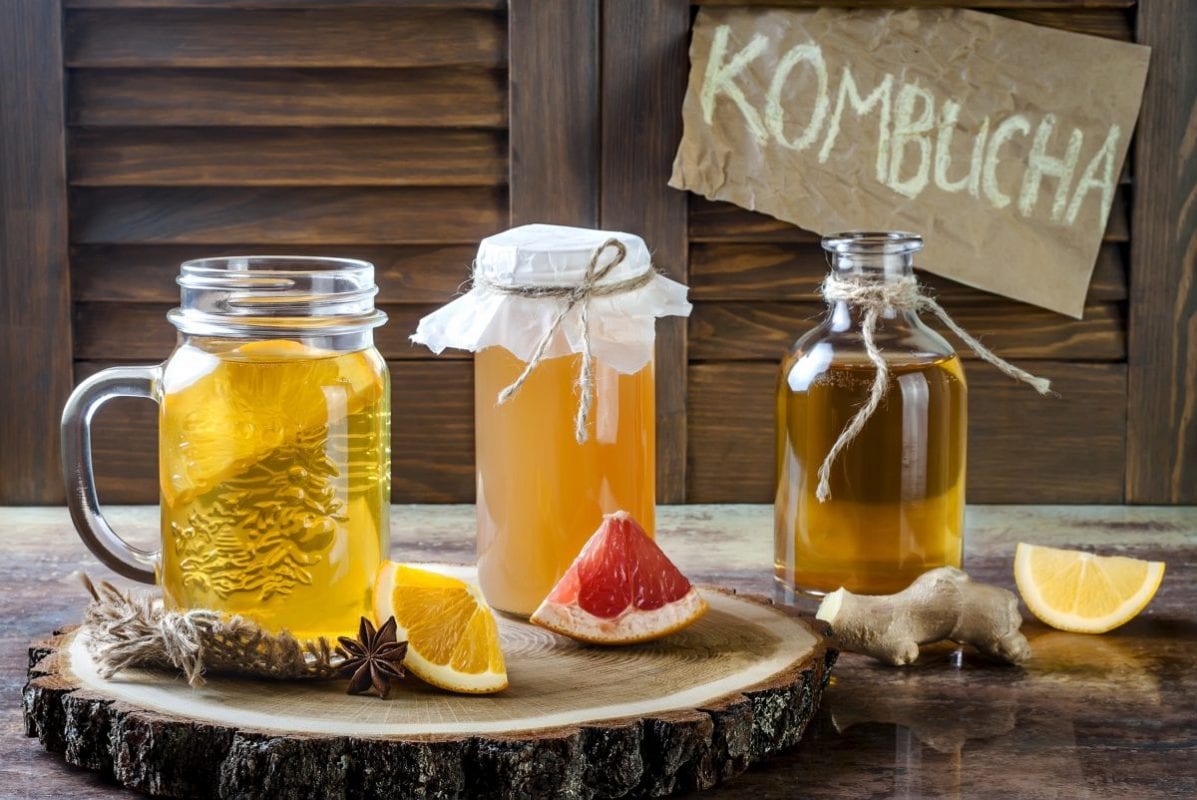It’s fascinating to unearth age-old remedies that have stood the test of time. Amidst the surge of modern superfoods like coconut oil, açaí berries, kimchi, matcha, and spelt, one ancient elixir continues to capture attention: kombucha. This fermented-tea beverage, steeped in history and tradition, is experiencing a resurgence in popularity, drawing enthusiasts eager to unlock the myriad of kombucha health benefits. Join us on a journey to delve into the timeless allure of kombucha and uncover the remarkable contributions it offers to our well-being.
Kombucha, a fizzy drink created by fermenting tea (most commonly black or green) and sugar with a symbiotic culture of bacteria and yeast known as SCOBY, was first used for its healing properties in East Asia — initially in China, where it was beloved for its “energizing effects.” The elixir then made its way to Japan, before catching on in Russia, Germany, France, North Africa, Italy and finally Switzerland, where in the 1960s researchers noted it had health benefits similar to those of yogurt because it contains probiotics, which introduce new bacteria into the gut microbiome.
Today, all across North America, you’ll not only find kombucha at most health-food stores but sharing shelf space with juices and sodas in an increasing number of regular delis and mini-marts. In fact, a recent report showed that sales of kombucha are expected to grow by 25 percent every year through 2020 to a value of $1.8 billion.
But what scientific evidence do we actually have about the health benefits of drinking the bubbly, vinegar-like brew?
“The health benefits have been touted, but not studied in a well-controlled environment,” says Jo Ann Hattner, a San Francisco-based registered dietician and nutritionist and co-author of Gut Insight: Probiotics and Prebiotics for Digestive Health and Wellbeing. “We do know that the drink contains probiotics,” Hattner says, noting, “I have clients who drink kombucha because they want to enjoy a fermented drink and they want the live fungi and bacteria for their gut health. These clients are often looking for a fermented, dairy-free drink.”
But beyond the knowledge about probiotics — confirmed in lab tests of kombucha’s properties — we don’t have many studies to go on. That’s because the body of scientific evidence we do have is based on largely on animal testing, which leaves some experts skeptical.
Here’s a look at what we know — and don’t exactly know — about the health benefits of kombucha:
GUT HEALTH
Because the fermentation process makes a drink that’s rich in probiotics, many believe that drinking kombucha is good for your gut health, providing a healthy blend of bacteria to absorb nutrition and fight off infection in a way that’s similar to that of fermented kimchi, sauerkraut or yogurt.
ANTIOXODANT POWERS
Like green tea, kombucha may share some of its beneficiary antioxidant properties. The prebiotic action of green tea increases our gut’s population of healthy bacteria that produce short chain fatty acids. These fragments are produced as metabolites of gut bacteria and they have anti-inflammatory effects in the intestine. These same benefits are believed to also be found in kombucha.
CANCER PREVENTION
The anti-cancer potential for kombucha most likely comes from the anti-angiogenic (cancer starving) properties of tea. Green tea contains a polyphenol called EGCG, which can starve cancers by cutting off their blood supply. Those are great reasons to opt for kombucha that’s been brewed from green tea, rather than black or red. Further, an enriched microbiome may also better protect the body against cancer by boosting the immune system. It should be noted however, that more research is needed before kombucha can be regarded as having anti-cancer properties.
Bottom line: Kombucha, although lacking a big body of scientific evidence in its favor, is refreshing, backed by centuries of use, and good for your gut.
Kombucha Brands We Love
True Büch

True Büch is a Calgary based kombucha company that first opened its doors in 2014. It started small, and the goal was simple – to brew great tasting kombucha and give back to the local community that supports us. Since then True Büch has found its way into some of our favourite retailers across the country. They have stayed true to their original plan by continuing to only use the best quality organic and local ingredients and by reinvesting a portion of our profits into projects that are close to our hearts.
Boocha

Boocha’s kombucha is crafted by hand in small batches right here in Edmonton. Starting with a blend of green, black and yerba mate teas, they brew the perfect cup of sweet tea and after letting it cool to room temperature, they add in their SCOBY, (Symbiotic Culture of Bacteria and Yeast) packing Boocha full of probiotics, healthy enzymes, and amino acids that are important to a healthy body. After a week of culturing, a concentrated tea flavour is added to the Boocha base and it is ready to bottle. Boocha comes in a variety of flavours and is a healthier, lower-sugar-than-pop fizzy drink. Boocha’s kombucha is available at the City Market and a variety of retailers.
Be Fresh

Be Fresh Kombucha is part of the SPUD lineup available at Blush Lane Organic Market in Old Strathcona. With fresh flavours like Hibiscus Lemonade and Very Berry to the classic tastes of Mint Lime and Ginger, the Be Fresh products are created using organic, gluten free products. Their mint and lime are the real showstoppers in our opinion and perfect for the patio this summer. Fresh mint cleanses and refreshes, and crisp lime adds a kick. Coupled with the fizz from the ‘booch makes for a simply invigorating bevvy.
Wild Tea Kombucha

Wild Tea Kombucha was started in June 2015 by Emily Baadsvik who was transitioning into retirement from sport after representing the National Team at the Sochi Winter Olympics in 2014. Creating a line-up of cocktail inspired kombucha beverages like Pineapple Mojito and Strawberry Daiquiri and low sugar kombucha sodas, the Wild Tea Kombucha brand is growing in popularity across the province. Even our 13-year-old son who prefers a Sprite to any other beverage was enjoying the kombucha soda varieties (and with only 20 calories and 4 grams of sugar per can, we couldn’t complain)
As we conclude our exploration of kombucha’s health benefits, it’s evident that this ancient elixir offers far more than just a trendy beverage choice. From its origins along the ancient Silk Road to its modern-day resurgence, kombucha has remained a symbol of vitality and well-being. Its probiotic-rich composition promotes digestive health, its antioxidant properties combat oxidative stress, and its detoxifying effects support overall vitality.
As we embrace the wisdom of the past in our quest for optimal health, let kombucha stand as a reminder that sometimes, the most powerful remedies are the ones that have been with us all along. So, the next time you raise a glass of this effervescent brew, toast to the time-honored tradition and the countless benefits it bestows upon both body and mind. Here’s to health, longevity, and the timeless allure of kombucha.








